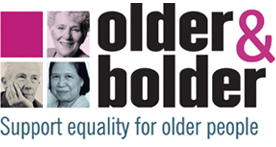Older & Bolder closed June 2013 This is an archived website
No Country to be Old and Sick
Older & Bolder is alarmed at the changes in medical card eligibility criteria announced as part of Budget 2013.
Older & Bolder Director, Patricia Conboy said, “These changes will not yield savings from the wealthiest in our society, rather it is middle Ireland, older people on incomes just above the new threshold, particularly those living alone, that will be hit hardest by the loss of the medical card. Unlike the medical card, the GP cards does not offer the same access to a range vital supports including public health nursing, social work services, community care services and certain in-patient public hospital services. In addition, any prescribed drugs associated with your GP visit are not free. The security that the medical card provides, especially for older people with ill health, cannot be underestimated. We hear from people who would forgo their modest occupational pensions in order to retain their medical cards”.
Patricia Conboy continued, “The cost of being sick and older in Ireland has now increased. For those with medical cards, prescription charges have increased by 300%. For those without a medical card and with high medical costs, changes to the Drugs Payment Scheme mean the threshold for support in purchasing prescription drugs has increased from €132 a month to €144”.
Patrica Conboy described the property tax as “an unforgiving tax for older people. The proposal to pursue property tax after death because people cannot afford to pay it in life does not strike us as being fair. Older people have, over decades and during periods of very high interest rates, striven to pay off their mortgages. A reasonable and widely shared goal is to arrive into older age debt free in order to maximise independence post-retirement and to pass on something, other than debt, to a future generation. This proposal risks turning a hard won asset, house ownership, into a liability”.
Older & Bolder welcomes the retention of the State Pension at current levels though the reductions to telephone and electricity allowance will cause concern. While on the face of it the announcement that the fuel allowance has not been reduced further this year seems positive, the increases in carbon tax on coal and turf will, in all probability, increase the cost of heating for older people.
Ms Conboy concluded, “with this Budget the devil is really in the detail, not all of which is available to us at the moment. Over the coming days Older & Bolder will continue to analyse the proposals to gauge the exact implications for older people."
--- ENDS ---
Notes to the Editor
a) The promotion of an age friendly and age inclusive society in Ireland is a core goal of Older & Bolder, an alliance of NGOs in the age sector. The member organisations are: Active Retirement Ireland, Age & Opportunity, Alzheimer Society of Ireland, Carers Association, Irish Hospice Foundation, Irish Senior Citizens Parliament, and Third Age/Senior Help Line
b) Far from being unscathed by austerity measures in previous Budgets, older people have been affected by : the loss of the Christmas bonus, implementation of Universal Social Charge, prescription charges, electricity levy, introduction of household charge, reduction in Fuel Allowance from 32 to 26 weeks, increased tax on home heating fuel, reduction in medical card cover for aural and dental benefits, increases in VAT and DIRT (tax on savings), cuts in frontline health and social care services and rising costs of medical insurance, and they will be affected by planned water and property tax charges. The latest and most indefensible cut is the €9 million cut to home help and home care services which effectively targets people, mainly older, experiencing chronic and life-limiting illnesses, disability and frailty
c) Older people are a diverse group. 45 per cent of older people have an income in the bottom 40 cent of incomes. Less than 5 per cent of older people are on incomes in the top income decile (above €39,000 per annum). 91 % of older people are at risk of poverty before they receive social transfers e.g. State Pension and Household Benefits Package. The State Contributory Pension is set at a maximum of just over €230 per week but almost half of those who receive this pension do so at a reduced rate. Furthermore, the qualifying criteria for a full State Contributory Pension have become more stringent since Budget 2012.





